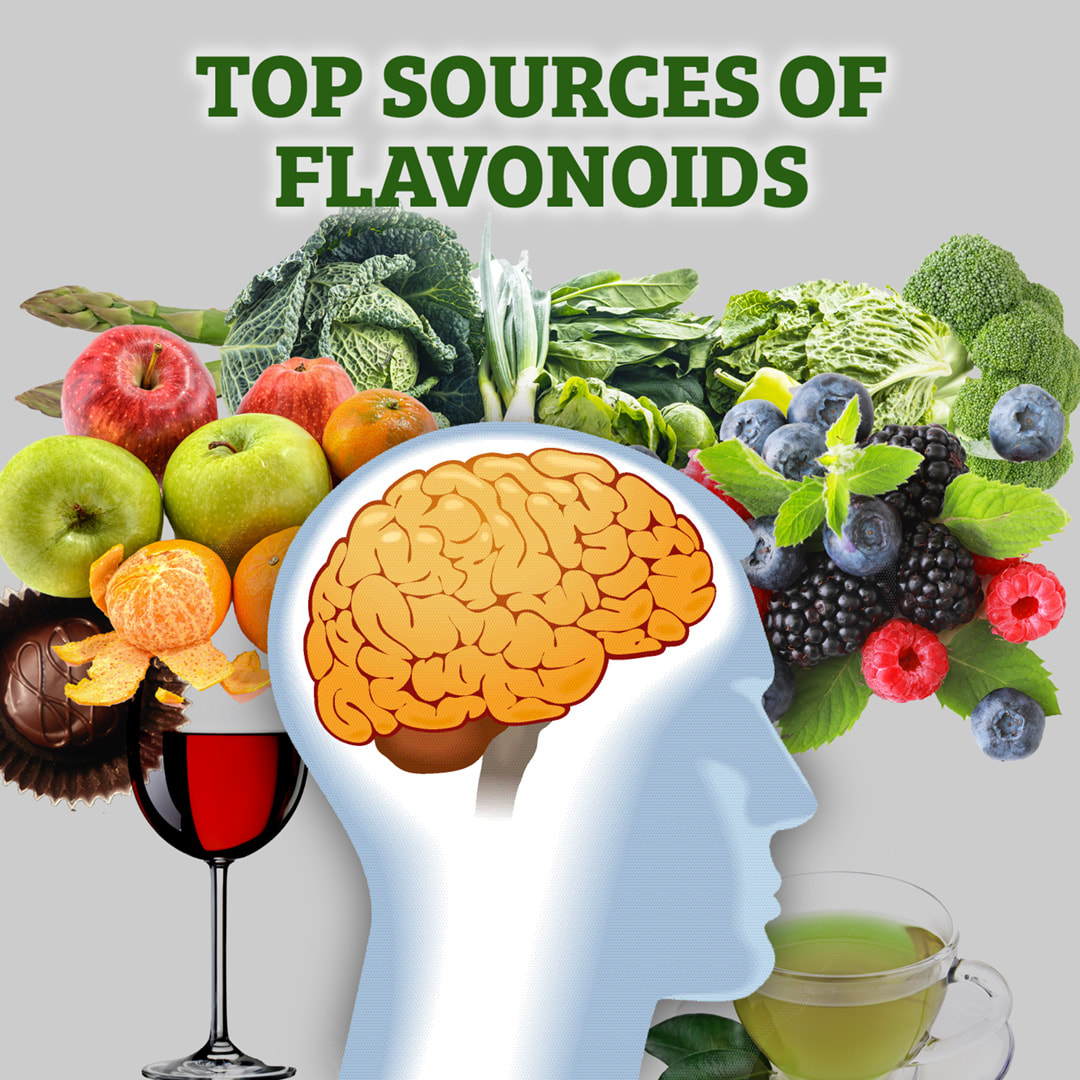|
Findings from a long-term review that followed 49,493 women from the Nurses’ Health Study (NHS) (1984-2006) and 27,842 men from the Health Professionals Follow-up Study (HPFS) (1986-2002) concluded that a higher intake of total flavonoids was associated with lower odds of subjective cognitive decline after adjusting for age, total energy intake, major non-dietary factors, and specific dietary factors.1
Another late 2020 study also noted positive associated benefits, concluding that “higher dietary intakes of flavonols may be associated with reduced risk of developing Alzheimer dementia.” Flavonoids are a large family of naturally occurring, polyphenolic plant compounds that give many foods their vivid hues. There are six major subclasses of flavonoids, including anthocyanidins, flavan-3-ols, flavonols, flavanones, flavones, and isoflavones, with flavonols being the most widely found subclass in our diet. Some of the best nutritional sources include:
How do flavonoids exert their actions? We’ve talked extensively about the role of inflammation and its deleterious effects on overall health as well as its role in the initiation of neurological disease. According to the Micronutrient Information Center at the Linus Pauling Institute, Oregon State University, inflammation, oxidative stress, and transition metal accumulation do appear to influence the pathology of several neurodegenerative diseases, such as Parkinson’s disease and Alzheimer’s disease. So, the various properties of flavonoids, including their protective mechanisms in vascular health, also could have beneficial effects on the brain, possibly in the protection against cerebrovascular disorders, cognitive impairments, and subsequent stroke and dementias. Dietary flavonoids and/or their metabolites have been shown to cross the blood-brain barrier (BBB) and exert preventive effects towards cognitive impairments in animal models of normal and pathological aging.2 (As we continue to impress upon patients, we really are what we eat!) Read more about the gut-brain connection and the BBB at: https://www.suzannegazdamd.com/blog/does-all-disease-begin-in-the-gut You may recall too the results of research published last year, which found that in combination with a vitamin C protocol, the bioflavonoid Quercetin had potential anti-viral effects as well. But it’s important for anyone, especially if you are currently taking medications for existing conditions, to check with your physician before adding any supplements. As always, we encourage you to consume a balanced diet that includes fresh fruits and vegetables, complex carbohydrates, eliminates sugar and refined processed foods to ideally contribute to both overall and brain health. If you have questions or would like additional information, please check our extensive blog library for a number of related articles regarding nutrition and neurological health. And don’t hesitate to reach out to our offices if we can help! In health and healing, Dr. Suzanne Gazda References and additional reading: 1 Tian-Shin Yeh, Changzheng Yuan, Alberto Ascherio, Bernard Rosner, Walter Willett, Deborah Blacker. Long-term Dietary Flavonoid Intake and Subjective Cognitive Decline in US Men and Women. Neurology Jul 2021, 10.1212/WNL.0000000000012454; DOI: 10.1212/WNL.0000000000012454 https://n.neurology.org/content/early/2021/07/28/WNL.0000000000012454 2 Micronutrient Information Center - Linus Pauling Institute, Oregon State University https://lpi.oregonstate.edu/mic/dietary-factors/phytochemicals/flavonoids https://lpi.oregonstate.edu/mic/dietary-factors/phytochemicals/flavonoids#cognitive-function Thomas M. Holland, Puja Agarwal, Yamin Wang, Sue E. Leurgans, David A. Bennett, Sarah L. Booth, Martha Clare Morris. Dietary flavonols and risk of Alzheimer dementia. Neurology Apr 2020, 94 (16) e1749-e1756; DOI: 10.1212/WNL.0000000000008981 https://n.neurology.org/content/94/16/e1749 Gazda Integrative Neurology, Eating Well for Life. https://www.suzannegazdamd.com/blog/eating-well-for-life
0 Comments
Your comment will be posted after it is approved.
Leave a Reply. |
AuthorDr. Suzanne Gazda, Integrative Neurology Archives
February 2024
Categories |

 RSS Feed
RSS Feed